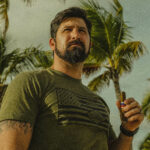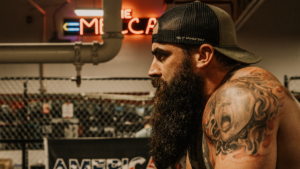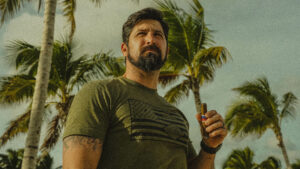IAN STRIMBECK – NO ONE IS COMING TO SAVE YOU
- Jack Donovan
- July 6, 2024
- Interviews

Ian Strimbeck photographed by Jack Donovan. 2021.
This interview was originally published in the CHEST magazine project in 2021-2022.
No One is Coming To Save You.”
That’s Ian’s tagline and the motto he uses to advertise his self-defense and firearms training courses. And while self-sufficiency and self-reliance can lead to rabbit holes that become obsessions (like anything else), the idea that “no one is coming to save you” is an essential counterpoint to the assurances we receive from our aspiring overlords.
“Don’t worry about it. You’re safe. We’ll take care of everything and make sure you’re ok…”
When you say it out loud, you realize that’s how you talk to a child. Someone inside the perimeter of your protection. Someone who depends on you.
It is the job of men to watch the outside of the perimeter and, when necessary, become the one who does the saving and be the guy on who someone else — someone less able or willing — can depend.
We outsource this work to our own spiritual demise.
And the truth is, in many cases, no one really is coming to save us. Law enforcement may show up on the scene, or they may merely clean up the aftermath and punish the people who did the thing that already happened to you or your loved ones. “The Doctors” may be able to help you, but they may also be corrupt or just wrong — so in the end, what happens to you is…still on you. The people who want you to believe otherwise are the people who want you to be their “children.”
Background
In Strimbeck served in the infantry in the Marine Corps from 2006-2010, including a year in Iraq and some time in the Mediterranean. After leaving the Marines, he enrolled in college and worked for an executive protection firm doing private security in Massachusetts. He started teaching firearms classes during this time and supplemented his income by doing door work at “less than desirable bars in less than desirable areas of Boston.” He says that experience “opened [his] eyes to the everyday criminal interaction and how fast and violent situations can become — especially in small and compromised spaces.” Eventually, he started his own training operation, Runenation LLC. Ian is also a purple belt in JiuJitsu.
I met Ian for dinner with some of his firearms instructor associates at a German restaurant chain in Vancouver, Washington, several years ago. We had a fun night at Shot Show one time when a reader hooked me up with table service at a Vegas nightclub — and Ian almost had to come save me. I’ve also had him on my podcast a number of times.
So we’ve known each other for years, but I’d never taken one of his courses, so I reached out and signed up for a Limited Signature Pistol class that he held in Utah recently. I’m a novice shooter at best, but Ian watched me work and helped me out with some suggestions and gear recommendations.
(I picked up a Leupold DeltaPoint® Pro he recommended for my Glock)
After the course, he came to my studio, and we took some photos for this article, then reconnected remotely to conduct the remainder of this interview.
Beyond Firearms
Ian is a firearms instructor and takes his role very seriously, but he has hard words for men who carry a gun “for clout” and also for “gun purists” who think carrying a firearm is the end-all-be-all of self-protection. He stresses that using a firearm should always be the “very last option.” There are “plenty of options that people can [and should] look into” that don’t require lethal force and which “avoid the potential post-shooting events that most people don’t want to think about” — like having your firearms seized and going through the court system.
Strimbeck believes people should be able to tap into a baseline of athleticism and grappling, and they should know how to “talk to someone on the street” and “de-escalate a potential situation.” He says that all of these things give you a sense of confidence and additional options beyond reaching for a gun. He has observed that “gun purists” tend to be some of the most insecure people because they rely solely on “that piece of metal” to protect them in what could potentially be “the worst day of their life.”
I asked him for some resources for conflict resolution and de-escalation. Ian speaks highly of the ECQC (Extreme Close Quarters Concepts) courses conducted by former narcotics officer Craig Douglas through his company Shivworks.
He also recommends the books:
The Gift of Fear by Gavin de Becker, and
Three Second Fighter by Geoff Thompson
We talked about situational awareness and avoiding completely unnecessary conflicts. Ian said that many “gun purists” have an overbearing sense of pride and feel that they should never have to take a different route or avoid an obvious problem waiting to happen. There are still a lot of guys who think they’re operating under cowboy rules.
“100 or so years ago, you could draw at high noon in the town square and be done with it. But with the legalities involved in the whole system nowadays, that’s not going to work out too well.”
On Censorship
Frustrated by social media corruption and censorship, Ian created his own miniblog called Mind Fuel that people who vibe with his work can subscribe to. It’s something a little like his own Instagram — combining thoughts with the emotional power of images — but with more intention and fewer limitations. And it’s behind a low-cost paywall, so every statement and comment isn’t a public press release.
To showcase his longer-form writing, Strimbeck created a mini-magazine project titled Discourse, where he sporadically publishes progressions of thoughts about life and training. Here’s a sample from one of his first issues:
“How can one truly know oneself if having never engaged in purpose-driven conflict?
Humans avoid what’s hard, it’s simple logic in all honesty. “Wow this shit hurts, guess I should stop doing it.” Things of great beauty usually involve some great pains. I use that analogy when people ask me why 90% of my body is covered in ink. It’s an unspoken trade-off between my artist and my body. I obtain an eternal piece of art that’s completely dependent on my pain threshold. I’ve seen grown men in shops straight up pass out like a sack of potatoes over a thumb-sized rose on their forearm. Meanwhile, I’ve seen others lay down for naps as they have an entire chest piece outlined and shaded. The same concept applies to every other facet of your life as well. The success of your business, fitness, martial arts, or shooting all correlate to your ability to withstand the storm. How close can you balance the line between your perceived limitations and death itself?”
All current and future issues of Discourse are available for a one-time subscription fee.
Modern readers have been trained to think that all discourse should be free, but the true cost to the social media they consume is that they must accept the curation of an algorithm with the corporate Californian values. Writers and creators who operate beyond the cultural equivalent of Interstate 5 are always waiting for the day when some shadowy “community standards” tribunal will pull the plug on them or stifle their voices.
Firearms and self-defense trainers like Ian are always, for obvious reasons, on the top of the not-so secret but not-quite-published “kill list.” And that makes them among the most important voices to make sure we don’t lose track of. We should all probably keep a running set of bookmarks titled “MEMORY HOLE” so that we can check in on and continue to commune with the targeted and the fallen.
In fact, I think I’ll start one now…
Ian said he believes that the only way things will change on big tech platforms is for content producers to boycott them and create alternatives. To stay true to his own values, Ian believed that he needed to create something else, and his Mind Fuel and Discourse projects have been his attempt to do that.
On the choice between comfort and holding the line
We talked about how censorship is, by design, manipulating many people’s perception of what is going on. For instance, most people aren’t even aware of the draconian rules that the Australian government has put into place. Or the way that the Australian state has used violence to crush dissent — actions and policies that moderate Americans would have quickly recognized as gross human rights violations before the pandemic. Likewise, many don’t even know how bad Canadians have it. The mainstream media won’t cover anything that would undermine the narrative that big tech, big pharma, and big government have conspired to promote. The powers that be don’t want average Americans to know that what is going on in Canada and Australia is “on the table” for America. Americans still own firearms, so we are frogs that must be boiled more slowly.
I asked Ian how we impress on men that it is crucial to draw a line and hold it, instead of slowly allowing the state and corporations to erode our freedoms incrementally until they exist only in theory, and then not even that.
Ian thinks that this largely comes down to a question of comfort.
“It comes down to men having that conversation with their families about what they are willing to sacrifice in order to hold the line. Men are used to having these toys…this nice truck or this nice house or these nice clothes or whatever else their routine is. There has to be a conversation — if you’re actually going to hold the line and not just talk about it — about what sacrifices you’re going to have to be willing to make in order to hold that line. Maybe you’re going to have to quit that job and get one that doesn’t pay as much. Maybe you have to sell some things or give up some things to hold true to your own morals and ethics.”
“At the end of the day there are too many people who are willing to sacrifice true freedom for the perception of safety.”
“As men, we’ve forgotten where we’ve come from — from the days when we emerged from caves and had to beat another human to death with a rock because we wanted that piece of meat.”
Ian also believes that we have to be willing to surround ourselves with like-minded individuals who are also better than us in some way.
“If you constantly surround yourself with people who you could potentially look up to — men of worth and purpose — then it’s going to force you to get out there and become a better individual every day.”
At some point, we will all have to decide how much autonomy we’re willing to give away, and each of us will have to choose whether we’re going to fold or if we’re going to be willing to make the sacrifices necessary to draw the line and hold it. We will have to get more comfortable with being uncomfortable and accept the possibility that “no one is coming to save us.”

Living the Dream with Anthony “Dream” Johnson

John Lovell
Related Post
Ian Smith – On Manhood and Resistance
- Posted July 6, 2024
- by Jack Donovan
Aubrey Huff – Alpha American
- Posted July 6, 2024
- by Jack Donovan
John Lovell
- Posted July 6, 2024
- by Jack Donovan


